As a country, Denmark provides an excellent example of the Nordic Model, which is designated by an internationally high tax level and a correspondingly high level of government-provided services and income transfers to various groups like disabled people, retirees, unemployed people, and students. Because Denmark is a member of the European Union (EU), the Danish legislation and regulations correspond to the EU standards on almost all issues. Through this international collaboration, Denmark stands as one of the strongest supporters of trade liberalization.
Causes of Money Laundering
Denmark is not a country with serious cases of financial crimes. Therefore, it cannot be said that there are many risks of money laundering in the country. In addition, there are no trade-based money laundering activities in Denmark, and there is almost no public corruption. However, Denmark is geographically vulnerable to serving as a transit country for smuggling, just like its neighbor Norway.
Foreign criminal activities generally cause money laundering processes in Denmark, and the foreign crimes mentioned here are related to the trafficking of illegal drugs such as cocaine and heroin. According to the Danish Special Crime Unit (NSK), money laundering techniques are being used in the country to launder revenues from theft, tobacco smuggling, robbery, and human trafficking. From these criminal activities, illicit money transfers and foreign exchange services are commonly used to launder funds in Denmark.
History of AML
To combat illicit wrongdoings of money laundering and the financing of terrorism as a whole, the Danish government enacted several acts and regulations over the years. These parts of the legislation were meticulously designed through the international collaboration between the EU and the Financial Action Task Force (FATF).
Denmark initiated its first Anti-Money Laundering law with the Act on Measures to Prevent Money Laundering of 1993 (Hvidvaskloven). The act functioned as the initial framework of AML compliance in the country. Hvidvaskloven continues to act as the primary part of the legislation concerning money laundering offenses. It has been amended several times over the years to better align with the ever-changing global financial environment. The amendments were mainly made over the updates that were included within the EU Money Laundering Directives, the last one being the Sixth Anti-Money Laundering Directive (6AMLD) in 2021.
In order to reinforce these laws, the Danish authorities continuously produce implementations, such as the Central Business Register in 2017. With this register, authorities started to identify the beneficial owners of legal entities and assess AML risks more effectively.
The ongoing regulations of the Danish Financial Supervisory Authority (DFSA) and the executive orders (Bekendtgørelser) of the Danish government are also being published to supplement the integrity of the AML compliance system.
The Financial Regulators
Denmark's financial sector is subject to oversight by multiple significant bodies. The primary authority responsible for this oversight is the DFSA, also known as Finanstilsynet. Its primary mission is to uphold stability and the integrity of the financial industry. This involves monitoring banks, insurance companies, pension funds, and other financial entities to ensure they adhere to regulatory standards and protect the interests of consumers.
Moreover, the Danish Central Bank (Danmarks Nationalbank) assumes a crucial role in shaping monetary policy, managing the nation's currency, and overseeing foreign exchange reserves. These institutions collaboratively strive to maintain a robust and transparent financial system, thereby fostering economic growth and stability within Denmark.
Initiation of Effective AML Control
Denmark is noted as one of the countries with the lowest level of corruption. In the country, bribery and many other corrupt practices are not considered business obstacles. Denmark earned the top spot on Transparency International’s 2022 Corruption Perception Index with a score of 90/100. In 2021, The World Bank’s World Governance Indicator also placed Denmark under the spotlight with the Control of Corruption score of 100/100.
Denmark is not on the FATF List of Countries determined to have strategic AML deficiencies. The latest follow-up to the Mutual Evaluation Report in Denmark was undertaken in February 2021. Based on this assessment, it has been considered that the country is compliant for 6 and largely compliant with 32 of the FATF 40 Recommendations.
There is no doubt that Denmark’s AML success relies heavily on the meticulous implementation of AML laws and regulations, yet also the practice of financial integrity as a whole. The Danish Criminal Code forbids active and passive bribery in international anti-corruption conventions. Safeguards against corruption and abuse of power primarily rest with a healthy practice of integrity rather than formal rules and regulations.
Maintaining High-Quality AML Compliance
Elevate AML compliance efforts in Denmark with Sanction Scanner, a trusted software developer dedicated to ensuring stability and security for businesses. Sanction Scanner offers innovative solutions, including AML Transaction Monitoring and AML Name Screening, enabling Danish companies to navigate complex financial environments effectively.
With AML Transaction Monitoring, suspicious activities such as unusual transactions and high-risk transfers can be detected in real time. Furthermore, the AML Name Screening tool allows for screening individuals and entities against global sanctions lists and watchlists, safeguarding reputations and financial stability by avoiding risky associations.
To get a step ahead with Sanction Scanner’s accuracy, real-time monitoring, and comprehensive coverage, contact us or request a demo today.





